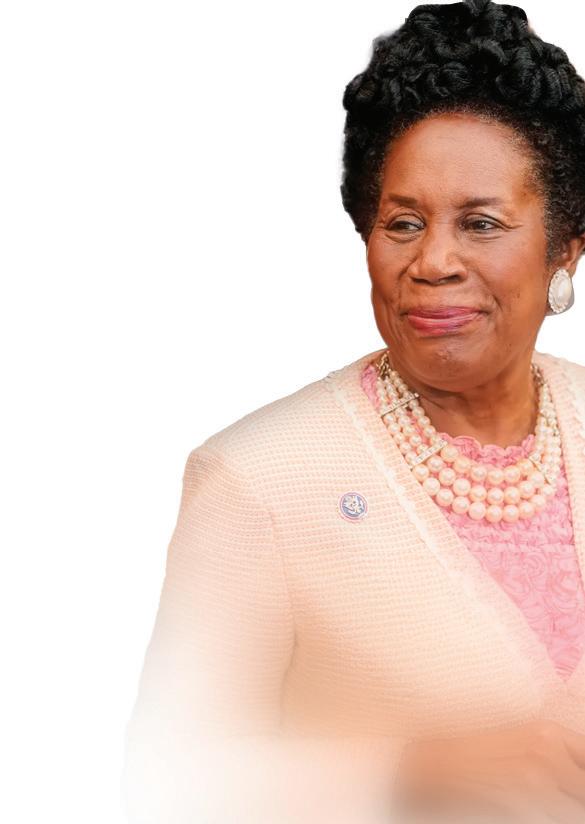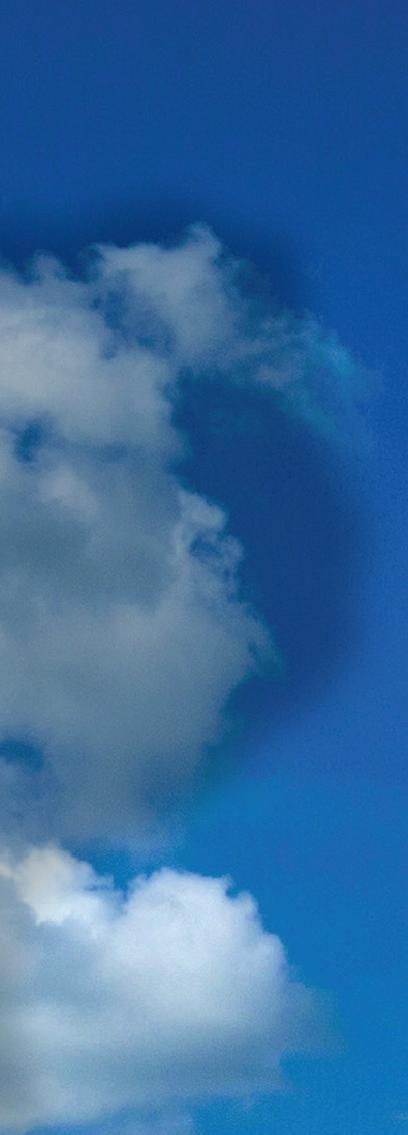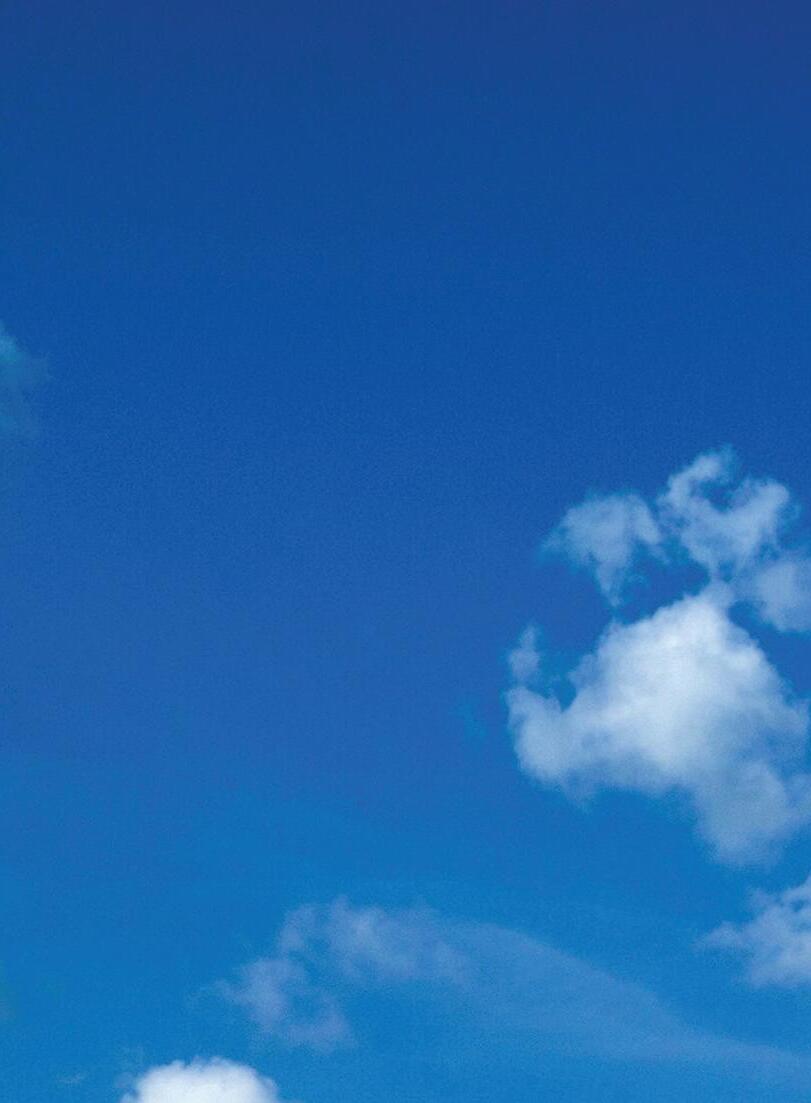


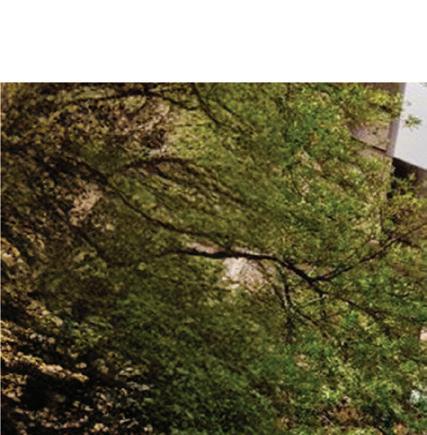



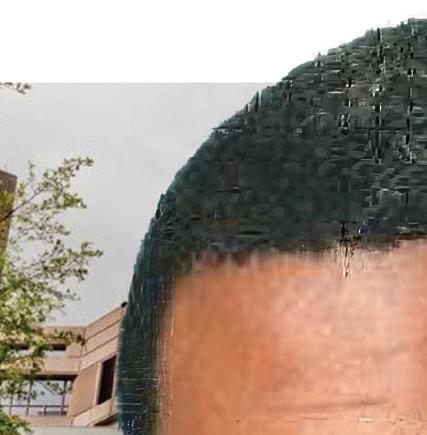

















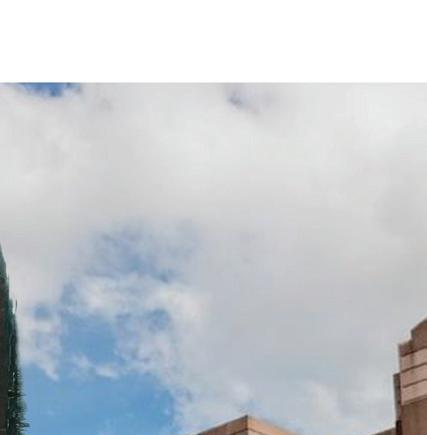


 By: Sharon Jenkins
By: Sharon Jenkins
e journey to leadership can o en be an unexpected path, lled with pivotal moments and experiences that shape an individual’s role and contributions to their community. For many, the title of “leader” is not something sought a er but rather something that comes as a byproduct of passion, hard work, and dedication. is has certainly been the case for Michael omas, an African American scientist in Houston, whose story illustrates how perseverance, excellence in one’s eld, and a commitment to giving back can pave the way for signi cant community impact.



From a young age, the subject of science captivated Michael. It all began with a simple childhood curiosity about the natural world. A small shack behind his house became his rst laboratory, where he explored and experimented with whatever he could get his hands on. is fascination with discovery and learning about the unknown set the foundation for a lifelong passion for science. A pivotal moment came when he conducted a groundbreaking “Addressing Current & Historical
We need to start holding each other accountable.- Roy Douglas Malonson
 By: Malonson Family
By: Malonson Family
Born on March 27, 1928, in the serene town of Lake Charles, Louisiana, Horace Malonson’s early life was marked by both joy and sorrow. He was the youngest son of Josiane Norman and John Oneal Melancon (aka Malonson), following his older brothers, John Curley and Andrew Malonson. Tragically, when Horace was just two years old, his mother passed away. In the years that followed, his father remarried, bringing a new sibling into Horace’s life—a half-sister named Mary Lucille Melanson (Nicholas).



Exactly 100 years ago this May, Congress passed a bill that allowed millions of Black Americans to li themselves out of poverty and to greatly increase their political power. But the legislation had nothing to do with civil rights or social safety net programs, at least not directly. Instead, the bill sharply reduced annual immigration levels.
By reducing the torrent of foreign labor arriving on U.S. shores, the Immigration Act of 1924 gave still-racist employers little choice but to recruit descendants of American slavery instead of waiting for the next wave of immigrants. Millions of Black southerners moved north in a “Great Migration” to higher-paying jobs.
Congress today has much to learn from the history of the 1924 Immigration Act. e law, and the decades that followed, show how tightening the labor market by restricting immigration can li the fortunes of America’s most vulnerable workers.
Between 1880 and 1924, labor competition with immigrants had severely depressed economic opportunities for freedmen. Ellis Island-era immigration gave northern industrialists the excuse they needed to avoid hiring freed slaves and their descendents.
Such blatant discrimination and its role in reducing bargaining power and pay for African Americans was clear to the nation’s Black publishers and other leaders.
“ is country is su ering from immigrant indigestion,” wrote A. Philip Randolph, the great Black union leader,
not long before passage of the 1924 immigration-reduction act. “It is time to call a halt on this grand rush for American gold, which over- oods the labor market, resulting in lowering the standard of living, race-riots, and general social degradation.”
Randolph and other Black leaders got much of what they wanted when President Coolidge signed the 1924 legislation. Immigration immediately plunged from 707,000 in 1924 to 294,000 in 1925. e number of new arrivals averaged less than 200,000 annually over the next 45 years.
Northern employers nally needed African American workers. As a result, roughly six million Black southerners moved to better jobs in other regions. Black workers’ status soared nearly twice as fast once expanding industrial opportunities allowed them to prove their productivity. Between 1940 and 1980, the real incomes of Black men rose four-fold. More than 70% of Black Americans were found to belong in the middle class by 1980, up from 22% in 1940.
e 1924 law wasn’t perfect. Its system of national quotas favoring northern Europeans and excluding many countries on other continents came to be seen as at odds with the nation’s move toward a raceblind society.

e desire to correct this racial discrimination inspired Congress to pass new immigration legislation in 1965 that inadvertently re-started the mass immigration of today -- which none of the 1965 law’s sponsors said they intended.

Democracy is a citizen driven system of government that is of the people, by the people, and for the people. e foundation of democracy is spiritual-moral values informed by basic tenets of human rights and human dignity: life, liberty, and the pursuit of happiness. us, democracy requires spiritual enlightenment in order that individuals do not devilishly lean upon their own sel sh instincts, but spiritually understand that all human life must be lived in community under the reality of God, and under the concept that equal is equal, not more or less equal, else we have a dog-eatdog environment. Democracy is for spiritually enlightened individuals as well as secularly educated individuals. is is why America has a free public educational system. Education of the masses, not just socio-economic elites. Hence, the Founders created a mass free universal educational system. In a democracy the economy is not controlled by the governmental system but is controlled by the private sector free enterprise system. erefore, the means of production of goods and services are not controlled by the federal government, but by whatever the marketplace will bear in the private sector. Again, because of human greed the market is controlled
by whatever the market can bear (withstand), price setting greediness. e government does not set the prices for goods and services. A classic example was the corporate price- xing of insulin, and the Biden administration was able to get the price reduced to (35) dollars. As a reminder, the governmental system is simply a taxing entity to provide military protection from external and internal threats, basic infrastructure needs such as roads, bridges, airports, and other common universal climate related necessity needs. Unfortunately, and mistakenly out of economic ignorance when the economy experiences an economic downturn or in ation occurs based upon corporate greed, blaming the President and the Federal Government becomes the wrong-headed economic whipping post rather than corporate sector price- xing. Hence, an ill-informed economic misunderstanding concerning the economy creates political confusion, and political confusion creates socio-economic confusion. For example, in Biblical times Israel desired a King, because every other nation-state had a King. e Prophet Samuel told the Israelites you do not need a King, because God told Samuel how to equally divide the goods and services. However, the Israelites desired a King, because they desired corruption, and they could not corrupt God’s Prophet, Samuel. God allowed them to choose Ahab the worst King in the history of Israel.


Leader Cont.
project on ants as a high school student. is project won the science fair and garnered signi cant attention, leading to a job o er at MD Anderson Cancer Center before he even began college. is opportunity allowed him to work in a professional lab environment, nurturing his scienti c skills and reinforcing his desire to pursue a career in research.
Despite these obstacles, he was determined to excel. Support came from unexpected places, primarily from white colleagues and mentors who recognized his talent and dedication. ese relationships were instrumental in his success, demonstrating that solidarity and support can transcend racial barriers. He emphasizes the importance of focusing on one’s work and being excellent at what you do, regardless of the external challenges.
One of his notable achievements involved developing a liquid magnetic colloid to remove cancer cells from the body. Although the method required fresh preparation for each use, making it labor-intensive, it saved hundreds of lives. is groundbreaking work showcased his ability to translate scienti c research into practical, lifesaving applications.
Pursuing a career in science during the 1970s presented unique challenges, especially as an African American. In a time when prejudice was prevalent, he attended Austin College in Sherman, Texas, where African American students were a small minority. roughout his academic and professional journey, he o en found himself as the only Black individual in the room, whether in classrooms, laboratories, or conferences.
His career at MD Anderson Cancer Center spanned 45 years, during which he signi cantly contributed to cancer research. Initially focused on nding the causes of cancer, he worked on projects investigating carcinogenic substances, such as yellow dye #2. His meticulous research and innovative approaches led to critical findings that influenced public health policies and practices.
To further support young people, he founded the College Science Conservation Association. is organization helps high school students, particularly those from underrepresented backgrounds, gain the knowledge and skills needed to secure scholarships and pursue higher education in science-related elds. rough summer camps and year-round training, he exposes students to various outdoor careers and practical scienti c applications, broadening their horizons and helping them see the potential beyond traditional corporate jobs.
In his retirement, he has found a new passion for outdoor education and conservation.


rooms, laboratories, or conferences. policies and practices.
In addition to his professional accomplishments, he has been deeply committed to mentoring the next generation of scientists. Understanding the importance of representation and support, he has actively participated in job fairs and career days, inspiring young students to pursue careers in science. His presence and success as an African American scientist provided a powerful role model for students, particularly those from minority backgrounds.
Read more at




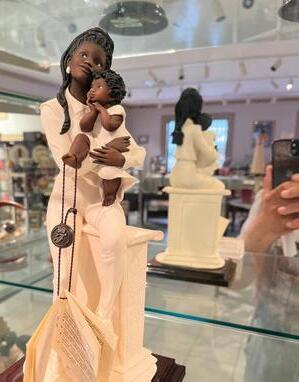

e illustrious graduates of George Washington Carver High School’s Class of 1974 commemorated their vibrant 50th Reunion with a memorable weekend of Festivities in the last week of May, hosted at e Royal Sonesta Galleria Hotel in Houston, Texas. Kicking o the reunion on Friday evening, attendees were treated to a delightful array of activities including games, delectable cuisine, exciting giveaways, thrilling ra es, and a musical ambiance that resonated with nostalgia and joy. Saturday’s highlight
was the grand banquet, where guests indulged in a sumptuous threecourse meal amidst an atmosphere brimming with camaraderie and jubilant spirits. e evening was further enlivened by a talented DJ spinning tunes that ignited the dance oor. Adding depth to the occasion, Warren Fitzgerald Muhammed, the recently appointed Chairman of the Acres Home Chamber, delivered an inspiring address, enriching the gathering with his insights and wisdom. On the serene Sunday
morning, the reunion took on a spiritual dimension with a heartfelt service led by esteemed classmate Pastor J.E Williams Sr. e gathering provided a sacred space for re ection, gratitude, and remembrance, as classmates came together to honor their shared journey and the cherished memories of their alma mater.
e weekend-long celebration served as a testament to the enduring bonds forged at George Washington Carver
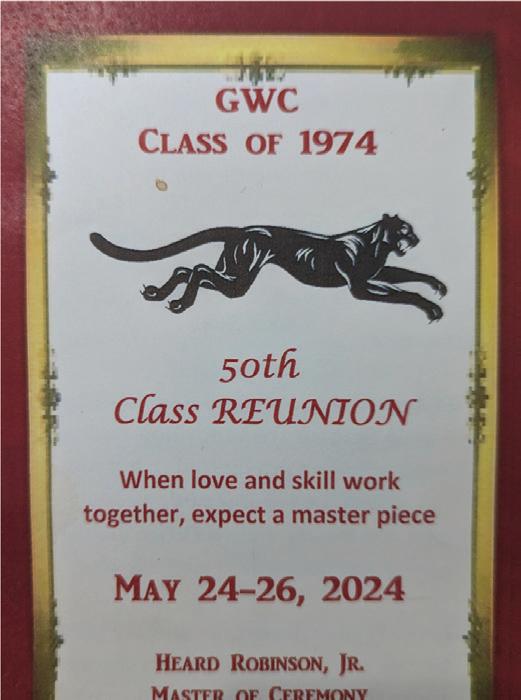

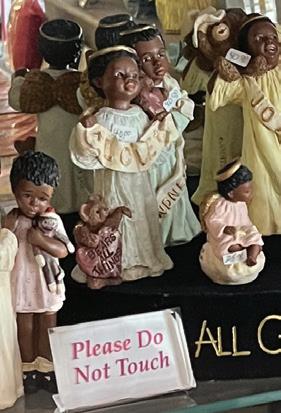
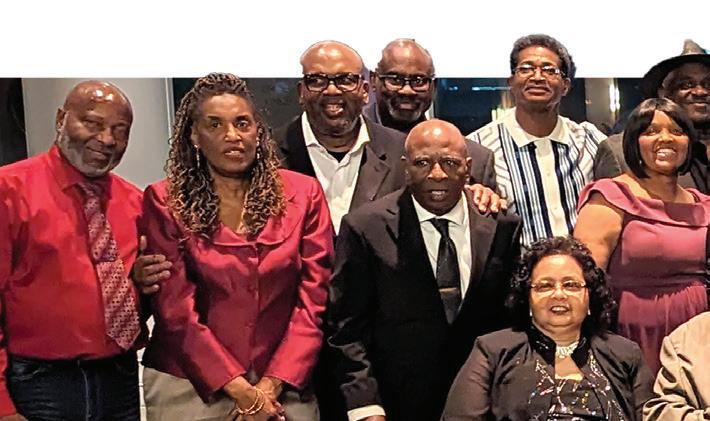
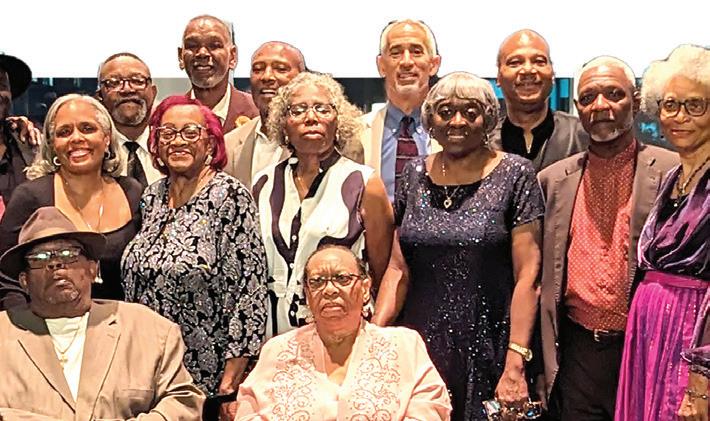
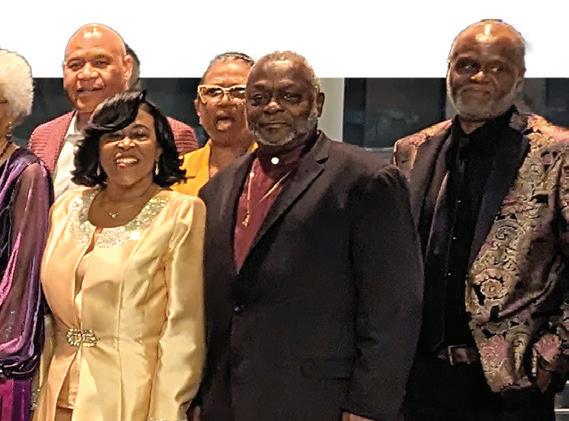

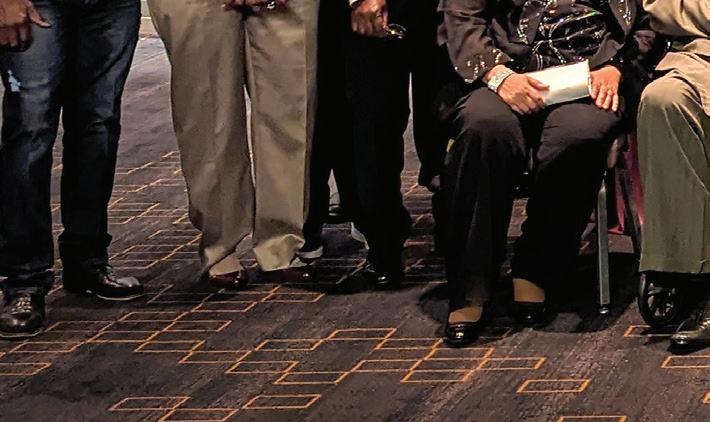
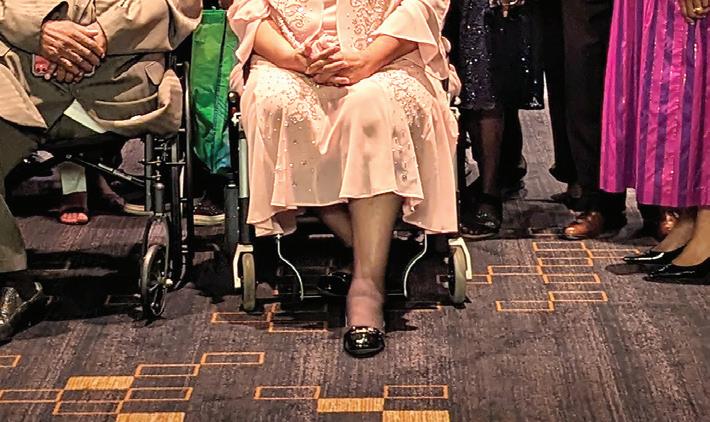
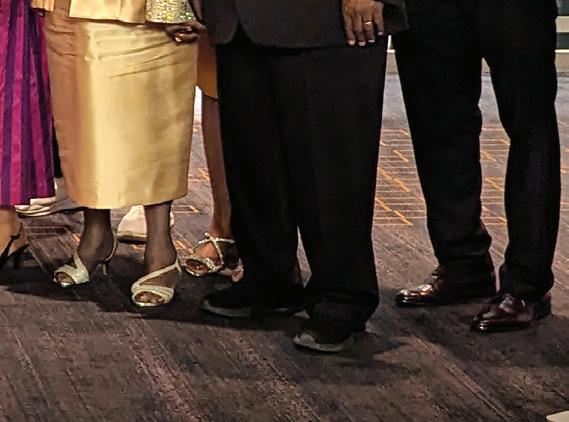




Due to the limited opportunities for education available to sharecroppers, people o en had to rely on the knowledge they could share with one another, which was inherently limited. e variations in name spellings arose from the challenging circumstances and cultural practices of the time, but the correct family name is Melancon. is was the surname of the family patriarch, John Oneal Melancon.
extended beyond the con nes of the packing company. On February 19, 1948, at the age of 19, he enlisted in the United States Navy. is decision marked the beginning of an adventurous and impactful period in his life.
Horace served as a machinist mate on the destroyer USS Borie DD704 during the Korean War. His role was crucial, as he was responsible for the operation and maintenance of the main engine and steam turbines. e
On February 14, 1952, Horace was honorably discharged, but his commitment to service continued as he remained in the Navy Reserves for an additional three years. Prior to his naval service, Horace had met the love of his life, Georgia Gordon, at an Our Mother of Mercy Church bazaar in Houston. eir romance blossomed through heartfelt letters exchanged while he was deployed. A signi cant moment in their love story was when
As a young man, Horfrom the quiet corners of How- ever, Horaspirations
ace’s journey took him from the quiet corners of Louisiana to the bustling city of Houston, Texas. ere, he found work at Blue Ribbon Packing Company as a butcher. Howace’s
steam turbines. e Navy allowed him to see the world, with memorable voyages to Hawaii, Europe, and the Suez Canal. His dedication and skill earned him several Navy medals, a testament to his invaluable contributions.
Georgia received her engagement ring by mail, a symbol of Horace’s deep commitment. is ring, representing more than a month’s earnings, marked the beginning of their lifelong journey together. Horace and Georgia married on April 19, 1952, and em-
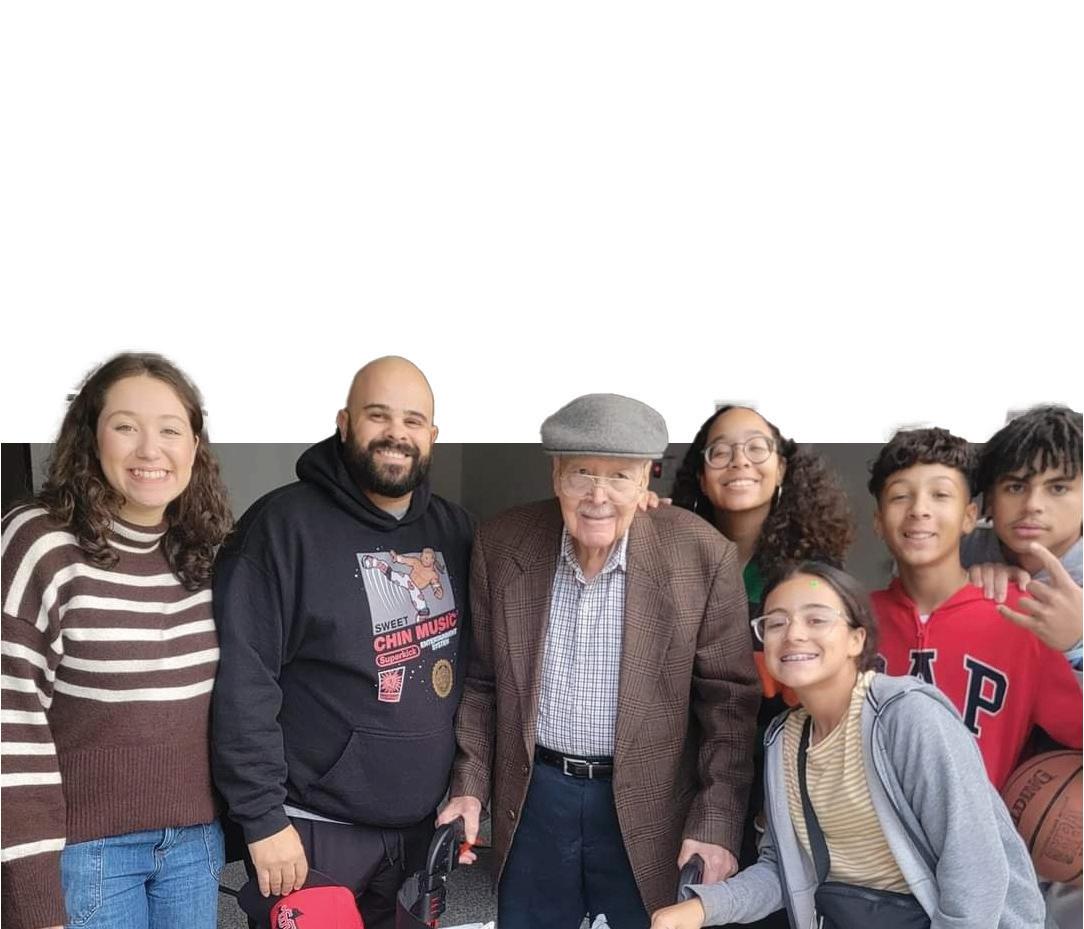
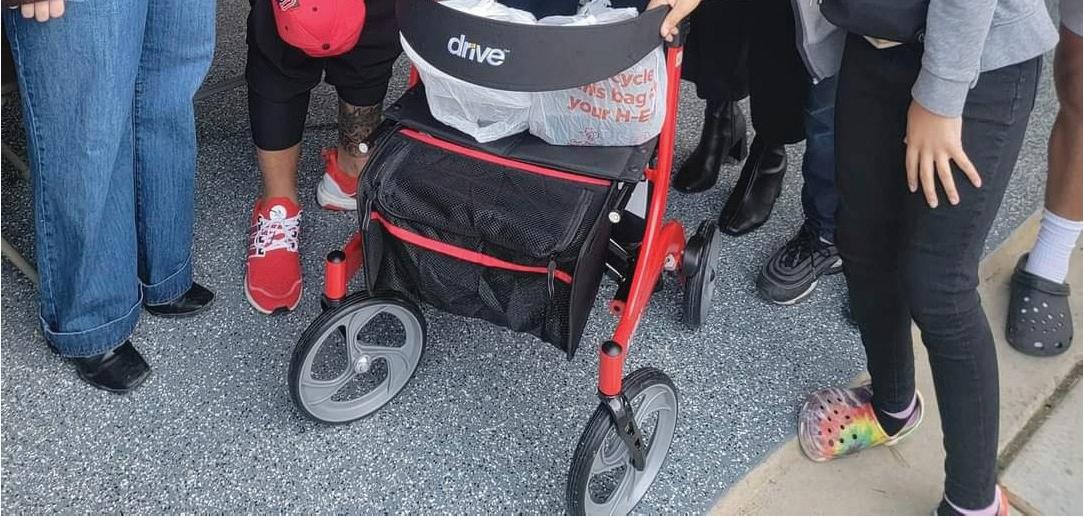
multiple jobs. He held positions at Southern Paci c Railroad, Port Terminal Railroad, Chrysler Corporation, and United Parcel Service. His relentless work ethic and dedication to his family’s well-being were truly admirable. Even in retirement, Horace continued to work as a yard man, embodying the values of hard work and perseverance.
A man of few words but profound wisdom, Horace imparted timeless advice to his loved ones: put God first; invest in education; make wise financial choices; prioritize family; and express love. His experiences in both
Horace was preceded in death by his parents, brothers, and half-sister. He leaves behind a loving family: his devoted wife Georgia, and his children Ray Anthony Malonson (Shirley), Mary Arsand Malonson (Angie), John Oneal Malonson, Catherine Denise Malonson Jones (Kenneth), Josena Ann Malonson Auzenne (Richard), and Jennifer Marie Celestine (Joseph). His legacy continues through his 14 grandchildren, 25 great-grandchildren, and countless nieces, nephews, and cousins.
barked on a beautiful, enduring journey lled with love, faith, and cherished memories. Over their 72-year marriage, they raised six children, instilling in them the values of the Catholic faith. Horace’s determination and resilience shone brightly as he pursued education despite numerous challenges. While in Louisana, he worked in the elds with his father to support the family, which prohibited his pursuit of education. However, when he relocated to Houston, he was able to pursue his education. Attending night school, he proudly graduated from Phillis Wheatley Senior High School, demonstrating his belief in the power of education.
School, education.
family, Horace worked tirelessly, o en juggling
experiences in both civilian and military life shaped his character, leaving a legacy of invaluable life lessons.
Horace Malonson’s life was a testament to sel ess service, enduring love, and unwavering dedication. His story is one of resilience, profound impact of a life
To support his growing family, Horace worked tirelessly, o en juggling ering dedication. His story is one of resilience, commitment, and the profound impact of a life well-lived.

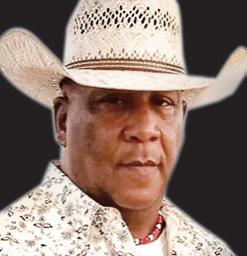
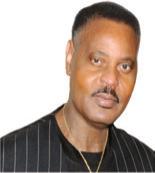

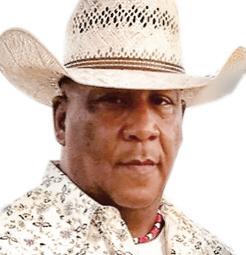
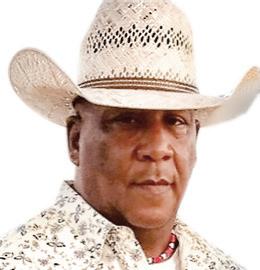




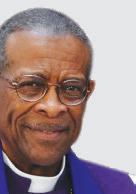







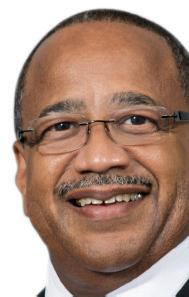



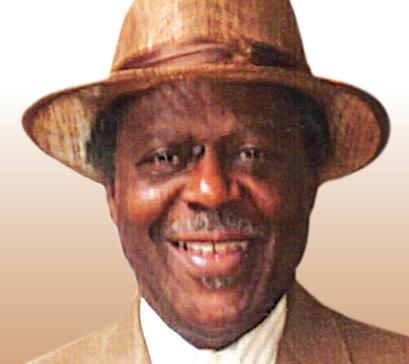

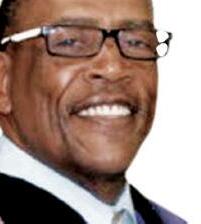













While the mainstream news media is xated on the trial of Donald Trump and his soaring poll numbers in spite of his legal problems, someone needs to have a conversation with President Biden about how he got in o ce and why he is losing the Black vote in particular, when he and the Democratic Party appear to think they have done enough for Black folks.
house, or a meeting with the “Divine Nine”, which does not represent rank and le voters in the Black communities.
“My adult life has been de ned by my faith in God, my love for humanity and my commitment to public service.
e Democratic Party appears to have forgotten that all states are “battleground states” if you are losing where you should be winning. Wake up call:
e Democratic Party continues to “Cherry Pick” the Black communities of this nation and the Black Press along with them. Well guess where the Black Press is located, in the Black communities. ere is an assumption that Black people will vote for Joe Biden because they did the last time. Well, Black people have not forgotten that he did not deliver on the George Floyd Act or the John Lewis Voting Rights Act. Neither did he put the same energy into seeking passage of these two pieces of legislation as he did in trying to nd ways, through Executive Orders, to bring relief in the face of the Supreme Court’s overturn of Roe vs. Wade.
Wake up call: the Black Vote is not concerned with a speech at Morethe John Lewis Voting Rights Act. Neither did he put the same energy into seeking passage of lation as he did in trying in touch with voter. She is the position she holds, but that enough to
As a member of Congress, I’ve been honored to be one of the leaders in the ght for justice and equality for all; especially the disadvantaged and the dispossessed.
Today, my ght is more personal, but I will approach it with the same faith and the same courage.”
“My doctors have conrmed my diagnosis of pancreatic cancer. I am currently undergoing treatment to battle this disease that impacts tens of thousands of Americans every year.”
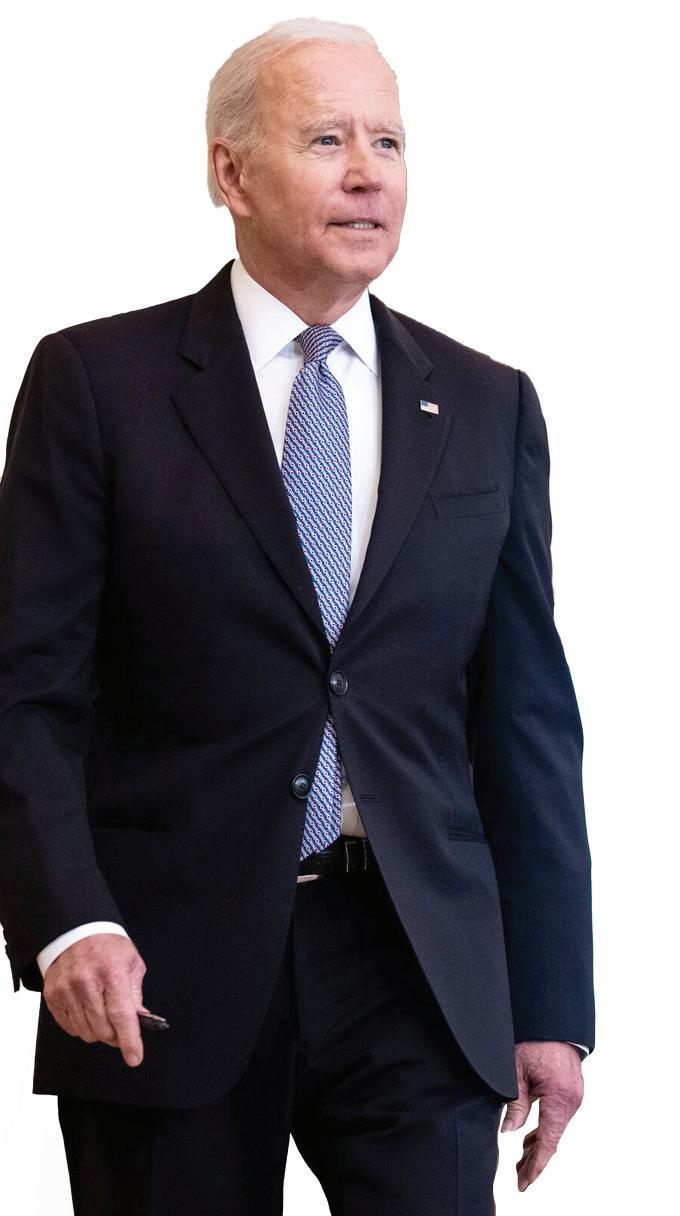
Vice President Harris is Black and a HBCU graduate, but that does not mean she is in touch with the Black voter. She is respected for the position she holds, but that will not be enough to keep it.
Donald Trump, on the other hand, is a known entity that is increasingly appealing to a Black male voter who has no knowledge of the Civil Rights struggle and what we stand to lose under Trump. ey are not bothered by the Stormy Daniels a air or any of the other women in Trump’s life. Some are out of jail because of Trump’s actions during his presidency. ey are not concerned about Democrats or Republicans, only higher food and gas and rent and in ation. You reach these men and women through the Black Press. Remember, they don’t have to vote. All they have to do is stay home and Trump wins. I think now - and not in September or October - is the time for a media campaign with the Black Press. Without such a campaign, there is no need to go to the Democratic National Convention. e absence of a Black media campaign is the exclusion of the Black Vote.
Black Americans who have lived through less than equality, with all sorts of disparities, will survive under a Donald Trump no matter what he does.


“I am con dent that my doctors have developed the best possible plan to target my speci c disease. e road ahead will not be easy, but I stand in faith that God will strengthen me.”
“To the constituents of the 18th Congressional District: Serving as your representative in Congress for 30 years is one of my greatest honors.”
“Your hopes and aspirations inspire my e orts on behalf of our community every day. As I pursue my treatments, it is likely that I will be occasionally absent from Congress, but rest assured my office will continue to deliver the vital constituent services that you deserve and expect.”
“I am committed to working with our Congressional Leadership, including Leader Hakeem Je ries and the Speaker of House, to serve this nation and be present for votes on legislation that is critical for the prosperity and security of the American people.
By God’s grace, I will be back at full strength soon.”
“Please keep me and my family in your prayers as you have always done. Know that you will remain in mine. As always, God bless you and God bless the United States of America.”
